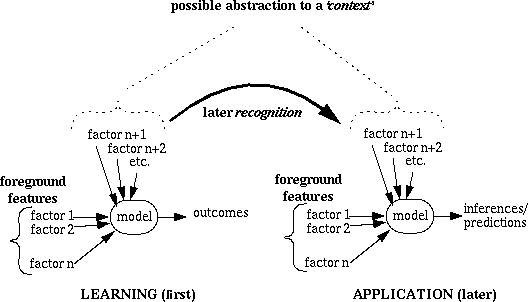
The Pragmatic Roots of Context - Bruce Edmonds
Roughly, I am going to attribute the label of `context' as a stand-in for those factors that are not explicitly included in the simple models we learn, or, to put it positively, those factors that we use to recognise when a model is applicable. This is similar to Zadrozky's approach:
"...for any procedure we can divide its parameters into two sets: those that change with each invocation of the procedure and those that are there but remain constant. The latter set will be called its content and the former its focus." [21]It is the possibility of the transference of knowledge via fairly simple models from the circumstances where they are learnt to the circumstances where they are applied which allows the emergence of context. The utility of `context' comes from the possibility of such transference. If this were not feasible then `context', as such, would not arise. This process of transference is illustrated below in figure 1.

Figure 1. The use of context in the transference of knowledge between learning and application
For such a transference to be possible a number of conditions need to be met, namely:
Given the above conditions are possible, I am defining `context' as:
While this transference of learnt models to applicable situations is the basic process, observers and analysts of this process might identify some of these combinations of features that allow recognition and abstract them as a `context'. This usually is possible because the transference of knowledge as models requires that the agent doing the transference can recognise these characteristic combinations, so it is possible that an observer might also be able to do so and give these combinations names. Note that it is not necessarily possible that such an observer will be able to do this as the underlying recognition mechanism may be obscure. Of course, it may be that the agent doing the transference itself analyses and abstracts these features, and thus makes this abstract available for reflective thought.
the abstraction of those elements of the circumstances in which a model is learnt, that are not used explicitly in the production of an inference or prediction when the model is later applied, that allow the recognition of new circumstances where the model can be usefully applied.
Due to the fact that context is characterised as an abstraction of an aspect of a heuristic for the learning and application of knowledge, the properties of such contexts can not be meaningfully analysed if one only considers either the learning or the application of such knowledge. If one did this one would not only be missing out on over half of the story but also undercutting the reasons for its very existence. If the problems of learning are ignored then there is no reason not to encode such models without context - the non-causal factors can be treated as either given or the same as the other features of the model, de-contextualising them. If the problems of inference are ignored then there is no reason to separate the recognition of an appropriate context from that of recognising the correct prediction in that context.
The Pragmatic Roots of Context - Bruce Edmonds - 31 MAR 99
[Next] [Previous] [Top] [Contents]
Generated with CERN WebMaker